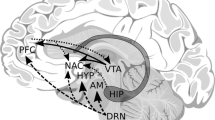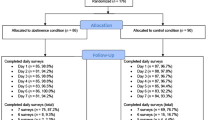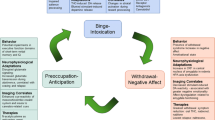Abstract
Rationale
Baclofen has been shown to effect fMRI alcohol cue reactivity in alcohol dependence, but potential varying effects related to baclofen dose levels have not been examined.
Objective
This study investigated whether baclofen attenuates craving and alcohol cue–elicited activation in alcohol-dependent treatment seekers, and the relationship between this response and clinical outcomes (Morley et al. 2018; Morley et al. 2013).
Methods
Participants included 30 alcohol-dependent individuals who had received daily baclofen 30 mg (n = 11), 75 mg (n = 8) or placebo (n = 11) for at least 2 weeks. Using functional magnetic resonance imaging (fMRI), we examined alcohol cue–elicited neural activation during a visual alcohol cue reactivity task 120 min following treatment administration, and alcohol cue reactivity and percentage of heavy drinking days (% HDD) associations were assessed.
Results
Both baclofen-treated groups reported fewer post-scan % HDD when compared to the placebo-treated group, but no subjective craving group differences were found. Increased alcohol cue–elicited activation was seen in placebo compared to the 75 mg/day baclofen participants in two clusters spanning prefrontal regions implicated in cue reactivity, chiefly frontal regions (i.e., frontal and precentral gyri, anterior cingulate cortex), but no observed alcohol cue reactivity differences between placebo and 30 mg/day baclofen groups. Post-scan % HDD was positively correlated with increased alcohol cue–elicited activation in a cluster encompassing the bilateral caudate nucleus and dorsal anterior cingulate cortex when comparing placebo versus 75 mg/day baclofen groups, and several clusters including prefrontal and mesolimbic regions when comparing placebo versus 30 mg/day baclofen groups.
Conclusions
Baclofen administration attenuates alcohol cue–elicited activation and reduced the association in baclofen-treated participants between increased activity in key drug cue reactivity regions and higher post-scan % HDD observed in placebo-treated participants, suggesting a dose-specific response effect that may lead to reduced heavy drinking in chronic alcohol-dependent individuals.
Trial registration
ClinicalTrials.gov, NCT01711125, https://clinicaltrials.gov/ct2/show/NCT01711125




Similar content being viewed by others
References
Addolorato G, Caputo F, Capristo E, Domenicali M, Bernardi M, Janiri L, Agabio R, Colombo G, Gessa GL, Gasbarrini G (2002) Baclofen efficacy in reducing alcohol craving and intake: a preliminary double-blind randomized controlled study. Alcohol Alcohol 37:504–508. https://doi.org/10.1093/alcalc/37.5.504
Addolorato G, Leggio L, Ferrulli A, Cardone S, Vonghia L, Mirijello A, Abenavoli L, D’Angelo C, Caputo F, Zambon A, Haber PS, Gasbarrini G (2007) Effectiveness and safety of baclofen for maintenance of alcohol abstinence in alcohol-dependent patients with liver cirrhosis: randomised, double-blind controlled study. Lancet 370:1915–1922. https://doi.org/10.1016/S0140-6736(07)61814-5
Agabio R, Sinclair JMA, Addolorato G, Aubin HJ, Beraha EM, Caputo F, Chick JD, de la Selle P, Franchitto N, Garbutt JC, Haber PS, Heydtmann M, Jaury P, Lingford-Hughes AR, Morley KC, Müller CA, Owens L, Pastor A, Paterson LM, Pélissier F, Rolland B, Stafford A, Thompson A, van den Brink W, de Beaurepaire R, Leggio L (2018) Baclofen for the treatment of alcohol use disorder: the Cagliari Statement. Lancet Psychiatry 5:957–960. https://doi.org/10.1016/S2215-0366(18)30303-1
Beck A, Pelz P, Lorenz RC, Charlet K, Geisel O, Heinz A, Wüstenberg T, Müller CA (2018) Effects of high-dose baclofen on cue reactivity in alcohol dependence: a randomized, placebo-controlled pharmaco-fMRI study. Eur Neuropsychopharmacol 28:1206–1216. https://doi.org/10.1016/j.euroneuro.2018.08.507
Beraha EM, Salemink E, Goudriaan AE, Bakker A, de Jong D, Smits N, Zwart JW, Geest D, Bodewits P, Schiphof T, Defourny H, van Tricht M, van den Brink W, Wiers RW (2016) Efficacy and safety of high-dose baclofen for the treatment of alcohol dependence: a multicentre, randomised, double-blind controlled trial. Eur Neuropsychopharmacol 26:1950–1959. https://doi.org/10.1016/j.euroneuro.2016.10.006
Bohn MJ, Krahn DD, Staehler BA (1995) Development and initial validation of a measure of drinking urges in abstinent alcoholics. Alcohol Clin Exp Res 19:600–606. https://doi.org/10.1111/j.1530-0277.1995.tb01554.x
Bschor T, Henssler J, Müller M, Baethge C (2018) Baclofen for alcohol use disorder—a systematic meta-analysis. Acta Psychiatr Scand 138:232–242. https://doi.org/10.1111/acps.12905
Chick J, Nutt DJ (2012) Substitution therapy for alcoholism: time for a reappraisal? J Psychopharmacol 26:205–212. https://doi.org/10.1177/0269881111408463
Corbit LH, Nie H, Janak PH (2012) Habitual alcohol seeking: time course and the contribution of subregions of the dorsal striatum. Biol Psychiatry 72:389–395. https://doi.org/10.1016/j.biopsych.2012.02.024
Courtney KE, Schacht JP, Hutchison K, Roche DJO, Ray LA (2016) Neural substrates of cue reactivity: association with treatment outcomes and relapse. Addict Biol 21:3–22. https://doi.org/10.1111/adb.12314
Evans SM, Bisaga A (2009) Acute interaction of baclofen in combination with alcohol in heavy social drinkers. Alcoholism: clinical and experimental research 33:19–30. https://doi.org/10.1111/j.1530-0277.2008.00805.x
Everitt BJ, Robbins TW (2005) Neural systems of reinforcement for drug addiction: from actions to habits to compulsion. Nat Neurosci 8:1481–1489. https://doi.org/10.1038/nn1579
Falk D, Wang XQ, Liu L, Fertig J, Mattson M, Ryan M, Johnson B, Stout R, Litten RZ (2010) Percentage of subjects with no heavy drinking days: evaluation as an efficacy endpoint for alcohol clinical trials. Alcohol Clin Exp Res 34:2022–2034. https://doi.org/10.1111/j.1530-0277.2010.01290.x
Farokhnia M, Schwandt ML, Lee MR, Bollinger JW, Farinelli LA, Amodio JP, Sewell L, Lionetti TA, Spero DE, Leggio L (2017) Biobehavioral effects of baclofen in anxious alcohol-dependent individuals: a randomized, double-blind, placebo-controlled, laboratory study. Transl Psychiatry 7:e1108. https://doi.org/10.1038/tp.2017.71
Farokhnia M, Deschaine SL, Sadighi A, Farinelli LA, Lee MR, Akhlaghi F, Leggio L (2018) A deeper insight into how GABA-B receptor agonism via baclofen may affect alcohol seeking and consumption: lessons learned from a human laboratory investigation. Mol Psychiatry. https://doi.org/10.1038/s41380-018-0287-y
Forman LM, Lucey MR (2001) Predicting the prognosis of chronic liver disease: an evolution from child to MELD. Hepatology 33:473–475. https://doi.org/10.1053/jhep.2001.22481
Freyer CH, Morley KC, Haber PS (2016) Alcohol use disorders in Australia. Intern Med J 46:1259–1268. https://doi.org/10.1111/imj.13237
Garbutt JC, Kampov-Polevoy AB, Gallop R, Kalka-Juhl L, Flannery BA (2010) Efficacy and safety of baclofen for alcohol dependence: a randomized, double-blind, placebo-controlled trial. Alcohol Clin Exp Res 34:1849–1857. https://doi.org/10.1111/j.1530-0277.2010.01273.x
Gilman JM, Ramchandani VA, Crouss T, Hommer DW (2011) Subjective and neural responses to intravenous alcohol in young adults with light and heavy drinking patterns. Neuropsychopharmacology 37:467–477. https://doi.org/10.1038/npp.2011.206
Goldstein RZ, Volkow ND (2002) Drug addiction and its underlying neurobiological basis: neuroimaging evidence for the involvement of the frontal cortex. Am J Psychiatry 159:1642–1652. https://doi.org/10.1176/appi.ajp.159.10.1642
Goldstein RZ, Volkow ND (2011) Dysfunction of the prefrontal cortex in addiction: neuroimaging findings and clinical implications. Nat Rev Neurosci 12:652–669. http://www.nature.com/nrn/journal/v12/n11/suppinfo/nrn3119_S1.html
Grüsser SM et al (2004) Cue-induced activation of the striatum and medial prefrontal cortex is associated with subsequent relapse in abstinent alcoholics. Psychopharmacology 175:296–302. https://doi.org/10.1007/s00213-004-1828-4
Haber SN (2016) Corticostriatal circuitry. Dialogues Clin Neurosci 18:7–21
Heinz A et al (2004) Correlation between dopamine D(2) receptors in the ventral striatum and central processing of alcohol cues and craving. Am J Psychiatry 161:1783–1789. https://doi.org/10.1176/appi.ajp.161.10.1783
Heinz A, Beck A, Grüsser SM, Grace AA, Wrase J (2009) Identifying the neural circuitry of alcohol craving and relapse vulnerability. Addict Biol 14:108–118. https://doi.org/10.1111/j.1369-1600.2008.00136.x
Hermann D, Smolka MN, Wrase J, Klein S, Nikitopoulos J, Georgi A, Braus DF, Flor H, Mann K, Heinz A (2006) Blockade of cue-induced brain activation of abstinent alcoholics by a single administration of amisulpride as measured with fMRI. Alcohol Clin Exp Res 30:1349–1354. https://doi.org/10.1111/j.1530-0277.2006.00174.x
Jahn A, Nee DE, Alexander WH, Brown JW (2016) Distinct regions within medial prefrontal cortex process pain and cognition. J Neurosci 36:12385–12392
Jasinska AJ, Stein EA, Kaiser J, Naumer MJ, Yalachkov Y (2014) Factors modulating neural reactivity to drug cues in addiction: a survey of human neuroimaging studies. Neurosci Biobehav Rev 38:1–16. https://doi.org/10.1016/j.neubiorev.2013.10.013
Koob GF, Volkow ND (2010) Neurocircuitry of addiction. Neuropsychopharmacology 35:217–238
Langosch JM, Spiegelhalder K, Jahnke K, Feige B, Regen W, Kiemen A, Hennig J, Olbrich HM (2012) The impact of acamprosate on cue reactivity in alcohol dependent individuals: a functional magnetic resonance imaging study. J Clin Psychopharmacol 32:661–665. https://doi.org/10.1097/JCP.0b013e318267b586
Leggio L, Zywiak WH, McGeary JE, Edwards S, Fricchione SR, Shoaff JR, Addolorato G, Swift RM, Kenna GA (2013) A human laboratory pilot study with baclofen in alcoholic individuals. Pharmacol Biochem Behav 103:784–791. https://doi.org/10.1016/j.pbb.2012.11.013
Lewis MD, Todd RM (2007) The self-regulating brain: cortical-subcortical feedback and the development of intelligent action. Cogn Dev 22:406–430. https://doi.org/10.1016/j.cogdev.2007.08.004
Lukas SE, Lowen SB, Lindsey KP, Conn N, Tartarini W, Rodolico J, Mallya G, Palmer C, Penetar DM (2013) Extended-release naltrexone (XR-NTX) attenuates brain responses to alcohol cues in alcohol-dependent volunteers: a bold FMRI study. Neuroimage 78:176–185. https://doi.org/10.1016/j.neuroimage.2013.03.055
Mann K, Vollstädt-Klein S, Reinhard I, Leménager T, Fauth-Bühler M, Hermann D, Hoffmann S, Zimmermann US, Kiefer F, Heinz A, Smolka MN (2014) Predicting naltrexone response in alcohol-dependent patients: the contribution of functional magnetic resonance imaging. Alcohol Clin Exp Res 38:2754–2762. https://doi.org/10.1111/acer.12546
Menossi HS, Goudriaan AE, de Azevedo-Marques Périco C, Nicastri S, de Andrade AG, D’Elia G, Li CSR, Castaldelli-Maia JM (2013) Neural bases of pharmacological treatment of nicotine dependence - insights from functional brain imaging: a systematic review. CNS Drugs 27:921–941. https://doi.org/10.1007/s40263-013-0092-8
Miller WR, Tonigan JS, Longabaugh R (1995) The Drinker Inventory of Consequences (DrInC): an instrument for assessing adverse consequences of alcohol abuse. vol 4. Project MATCH Monograph Series. NIAAA, Rockville
Morley KC, Leung S, Baillie A, Haber PS (2013) The efficacy and biobehavioural basis of baclofen in the treatment of alcoholic liver disease (BacALD): study protocol for a randomised controlled trial. Contemp Clin Trials 36:348–355. https://doi.org/10.1016/j.cct.2013.08.002
Morley KC, Baillie A, Fraser I, Furneaux-Bate A, Dore G, Roberts M, Abdalla A, Phung N, Haber PS (2018) Baclofen in the treatment of alcohol dependence with or without liver disease: multisite, randomised, double-blind, placebo-controlled trial. Br J Psychiatry 212:362–369. https://doi.org/10.1192/bjp.2018.13
Müller CA, Geisel O, Pelz P, Higl V, Krüger J, Stickel A, Beck A, Wernecke KD, Hellweg R, Heinz A (2015) High-dose baclofen for the treatment of alcohol dependence (BACLAD study): a randomized, placebo-controlled trial. Eur Neuropsychopharmacol 25:1167–1177. https://doi.org/10.1016/j.euroneuro.2015.04.002
Myrick H, Anton RF, Li X, Henderson S, Drobes D, Voronin K, George MS (2004) Differential brain activity in alcoholics and social drinkers to alcohol cues: relationship to craving. Neuropsychopharmacology 29:393–402
Myrick H, Anton RF, Li X, Henderson S, Randall PK, Voronin K (2008) Effect of naltrexone and ondansetron on alcohol cue–induced activation of the ventral striatum in alcohol-dependent people. Arch Gen Psychiatry 65:466–475. https://doi.org/10.1001/archpsyc.65.4.466
Pierce M, Sutterland A, Beraha EM, Morley K, van den Brink W (2018) Efficacy, tolerability, and safety of low-dose and high-dose baclofen in the treatment of alcohol dependence: a systematic review and meta-analysis. Eur Neuropsychopharmacol 28:795–806. https://doi.org/10.1016/j.euroneuro.2018.03.017
Reynaud M, Aubin HJ, Trinquet F, Zakine B, Dano C, Dematteis M, Trojak B, Paille F, Detilleux M (2017) A randomized, placebo-controlled study of high-dose baclofen in alcohol-dependent patients—the ALPADIR study. Alcohol Alcohol 52:439–446. https://doi.org/10.1093/alcalc/agx030
Rose AK, Jones A (2018) Baclofen: its effectiveness in reducing harmful drinking, craving, and negative mood. A meta-analysis. Addiction 113:1396–1406. https://doi.org/10.1111/add.14191
Santiago M, Machado A, Cano J (1993) In vivo release of dopamine from rat striatum, substantia nigra and prefrontal cortex: differential modulation by baclofen. Br J Pharmacol 109:814–818. https://doi.org/10.1111/j.1476-5381.1993.tb13647.x
Schacht JP, Anton RF, Myrick H (2013a) Functional neuroimaging studies of alcohol cue reactivity: a quantitative meta-analysis and systematic review. Addict Biol 18:121–133. https://doi.org/10.1111/j.1369-1600.2012.00464.x
Schacht JP, Anton RF, Randall PK, Li X, Henderson S, Myrick H (2013b) Effects of a GABA-ergic medication combination and initial alcohol withdrawal severity on cue-elicited brain activation among treatment-seeking alcoholics. Psychopharmacology 227:627–637. https://doi.org/10.1007/s00213-013-2996-x
Skinner HA, Allen BA (1982) Alcohol dependence syndrome: measurement and validation. J Abnorm Psychol 91:199–209
Sobell LC, Sobell MB (1992) Timeline follow-back. In: Litten RZ, Allen JP (eds) Measuring alcohol consumption: psychosocial and biochemical methods. Humana Press, Totowa, pp 41–72. https://doi.org/10.1007/978-1-4612-0357-5_3
Sullivan JT, Sykora K, Schneiderman J, Naranjo CA, Sellers EM (1989) Assessment of alcohol withdrawal: the revised clinical institute withdrawal assessment for alcohol scale (CIWA-Ar). Br J Addict 84:1353–1357
Vollstädt-Klein S, Wichert S, Rabinstein J, Bühler M, Klein O, Ende G, Hermann D, Mann K (2010) Initial, habitual and compulsive alcohol use is characterized by a shift of cue processing from ventral to dorsal striatum. Addiction 105:1741–1749. https://doi.org/10.1111/j.1360-0443.2010.03022.x
Wrase J, Grüsser SM, Klein S, Diener C, Hermann D, Flor H, Mann K, Braus DF, Heinz A (2002) Development of alcohol-associated cues and cue-induced brain activation in alcoholics. Eur Psychiatry 17:287–291. https://doi.org/10.1016/S0924-9338(02)00676-4
Yoshida M, Yokoo H, Tanaka T, Emoto H, Tanaka M (1994) Opposite changes in the mesolimbic dopamine metabolism in the nerve terminal and cell body sites induced by locally infused baclofen in the rat. Brain Res 636:111–114. https://doi.org/10.1016/0006-8993(94)90183-X
Young KA, Franklin TR, Roberts DCS, Jagannathan K, Suh JJ, Wetherill RR, Wang Z, Kampman KM, O’Brien CP, Childress AR (2014) Nipping cue reactivity in the bud: baclofen prevents limbic activation elicited by subliminal drug cues. J Neurosci 34:5038–5043
Acknowledgements
We would like to thank Dr. Anne Beck and Prof Andreas Heinz for kindly supplying us with the alcohol images for the cue reactivity task.
Funding
This study was supported by a grant from the National Health and Medical Research Council of Australia (P.S.H., A.J.B., K.C.M.).
Author information
Authors and Affiliations
Corresponding author
Ethics declarations
The study was approved by the Human Ethics Review Committee of the Sydney Local Health District (X11-0154). The study involved off-label use of a registered medication in Australia and approval was given under the Clinical Trial Notification (CTN) scheme of the Therapeutics Goods Administration (TGA) (2013/0060). All participants included in this MRI substudy provided written informed consent after commencement of randomisation for the main trial.
Conflict of interest
The authors declare that they have no conflict of interest.
Additional information
Publisher’s note
Springer Nature remains neutral with regard to jurisdictional claims in published maps and institutional affiliations.
This article belongs to a Special Issue on Imaging for CNS drug development and biomarkers.
Rights and permissions
About this article
Cite this article
Logge, W.B., Morris, R.W., Baillie, A.J. et al. Baclofen attenuates fMRI alcohol cue reactivity in treatment-seeking alcohol dependent individuals. Psychopharmacology 238, 1291–1302 (2021). https://doi.org/10.1007/s00213-019-05192-5
Received:
Accepted:
Published:
Issue Date:
DOI: https://doi.org/10.1007/s00213-019-05192-5




